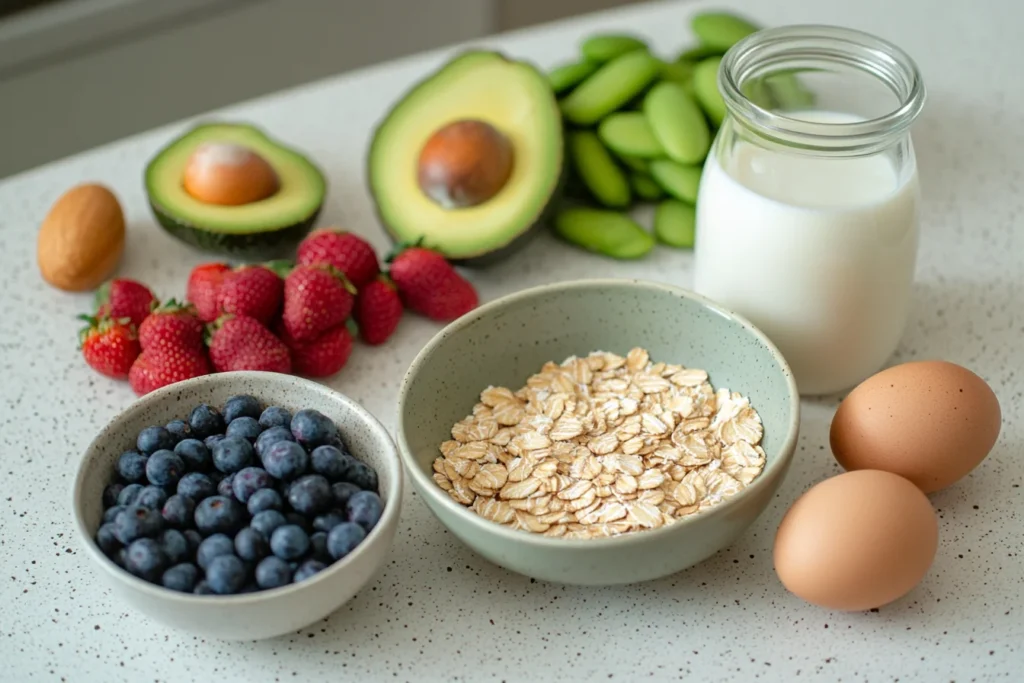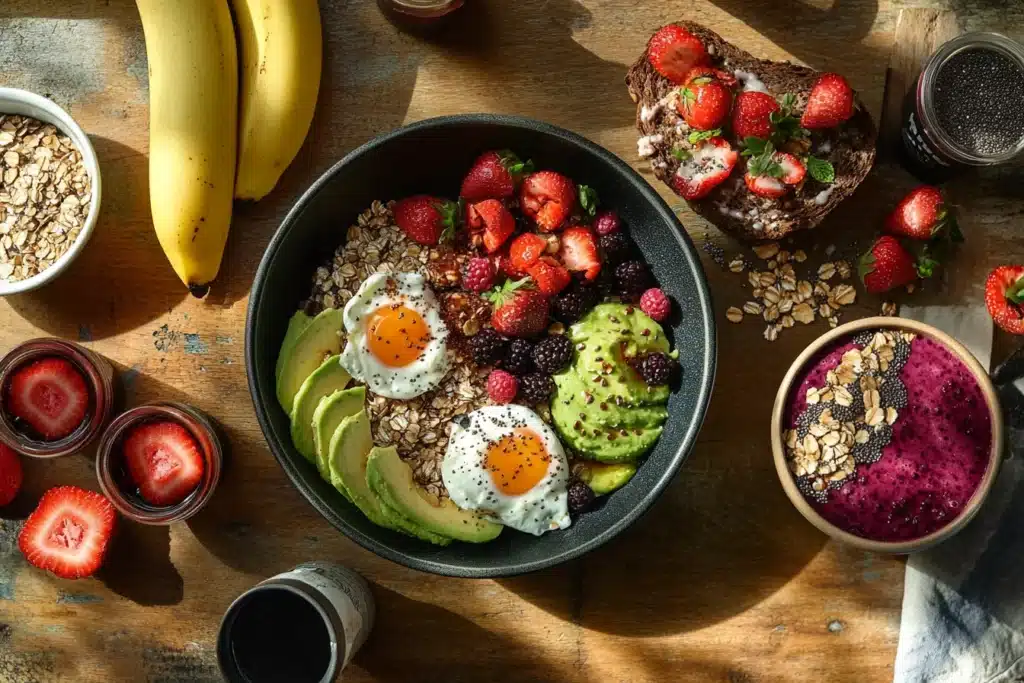Table of Contents
Teen athletes have unique healthy needs, and a healthy breakfast for athletes plays a pivotal role in setting them up for success both on and off the field. Moreover, whether they’re heading to practice, a game, or a full day of school, a healthy breakfast for athletes provides the energy, focus, and strength required to excel. In this guide, we’ll not only explore delicious and easy options but also share rich in Healthy recipes designed specifically for active teens.
Why a Healthy Breakfast for Athletes Matters
Breakfast isn’t just the first meal of the day; it’s the foundation for optimal performance. A healthy breakfast for athletes is Vital to meet their Challenging schedules. For teen athletes, it’s crucial to:
- Replenish glycogen stores Low overnight, Giving energy for morning activities.
- Support muscle repair and growth with Healthy proteins.
- Improve cognitive function, helping teens focus in school and during practice.
- Enhance hydration, ensuring the body is ready for physical exertion.
Key Nutrients for Teen Athletes

- Carbohydrates: Primary energy source for high-intensity activities.
- Examples: Oats, whole-grain bread, and fruits.
- Proteins: Essential for muscle repair and growth.
- Examples: Eggs, Greek yogurt, and protein shakes.
- Fats: Supports long-lasting energy and brain function.
- Examples: Avocado, nuts, and seeds.
- Vitamins & Minerals: Critical for bone health, immunity, and recovery.
- Examples: Calcium (milk, fortified alternatives), iron (spinach, lean meats).
- Hydration: Prevents fatigue and enhances endurance.
- Include: Water, smoothies, or hydrating fruits like watermelon.
For more insights on meal balance, check out Nutritional guidelines for balanced meals.
Hydration and Fluid Loss
Exercise causes the body to lose fluids and minerals through sweat, which can lead to dehydration if not managed. Combining hydration with a healthy breakfast for athletes ensures better overall performance. Teen athletes should:
- Drink plenty of water throughout the day, especially during exercise.
- Eat water-rich foods like watermelon, cucumbers, and oranges.
- Choose coconut water or electrolyte drinks to replace minerals like sodium and potassium.
Drinking enough water with a healthy breakfast for athletes helps boost stamina., reduces fatigue, and prevents cramps, making it necessary for sporty success. prevents fatigue, and stops spasms, making it vital for Sporty performance.
Detailed Macronutrient Breakdown
Fats
Fats are necessary for reducing inflammation and supporting joint health. Sources like omega-3 fatty acids from flaxseeds, chia seeds, and microalgae oil are particularly beneficial for athletes. Incorporating these into smoothies or oatmeal is an easy way to boost their intake.
Complex Carbohydrates
Complex carbohydrates, a vital part of a healthy breakfast for athletes, provide sustained energy crucial for long training sessions or games. For example, quinoa, amaranth, and millet can be used in porridge or breakfast bowls. Moreover, these grains are rich in fiber and essential nutrients, promoting both performance and recovery.
Common Nutritional Mistakes
- Relying on Processed Foods: Processed breakfast items often lack the nutrients Relying on Processed Foods: Skipping a healthy breakfast for athletes or relying on processed items often lacks the nutrients needed for sustained energy and recovery. Consequently, they can leave athletes feeling fatigued by mid-morning.
- Inadequate Carbohydrate Intake: Skimping on carbs can lead to energy crashes, especially during intense physical activity. Therefore, ensure meals include sufficient whole grains and fruits.
- Ignoring Hydration: Failing to replenish fluids and electrolytes hampers both physical and mental performance. To avoid this, encourage consistent water intake and the inclusion of electrolyte-rich foods.
The Philosophy of “All Meals Matter”
While breakfast is vital, consistency across all meals is key to fueling athletic performance. Every meal—from breakfast to dinner—should include a balance of carbohydrates, proteins, and fats to maintain energy levels and support muscle recovery. Snacks and post-training meals also play a critical role in overall nutrition.
The Link Between Breakfast and Academic/Physical Performance
Studies show that breakfast eaters perform better academically and physically. For instance:
- Improved test scores and attendance rates in school.
- Better focus and reduced morning hunger issues.
- Enhanced endurance and energy levels during practice and games.
Skipping breakfast has been linked to decreased cognitive function, emphasizing its importance for teen athletes who juggle both academics and sports.
Addressing Appetite Disruption
Late-night snacking can disrupt hunger hormones, which often leads to a lack of appetite in the morning. Therefore, encourage teens to:
Additionally, start the morning with something small, like a smoothie or a banana, if they struggle with larger meals.
Avoid heavy snacks high in sugar or fat before bed to promote better morning hunger.
Instead, opt for lighter evening snacks, such as a small yogurt or a handful of nuts, to maintain balance.
Top Ideas for Teen Athletes
1. Overnight Oats with Fruit
- Ingredients:
- ½ cup rolled oats
- 1 cup milk (or plant-based alternative)
- 1 tbsp chia seeds
- ½ cup mixed berries
- 1 tsp honey (optional)
- Benefits: High in fiber, complex carbohydrates, and antioxidants for sustained energy.
- Prep Tip: Make multiple jars for the week to save time.
2. Spinach and Egg Breakfast Wrap
- Ingredients:
- 2 scrambled eggs
- ½ cup spinach
- 1 whole-grain tortilla
- Sprinkle of cheese (optional)
- Benefits: Protein-packed and portable, perfect for busy mornings.
- Variation: Swap cheese for avocado for a dairy-free option.
3. Smoothie Bowl
- Ingredients:
- 1 cup frozen berries
- ½ cup Greek yogurt
- ½ banana
- 1 tbsp almond butter
- Toppings: Granola, chia seeds, and fresh fruit
- Benefits: Combines protein, healthy fats, and carbs in a quick, visually appealing meal.
- Pro Tip: Add a scoop of protein powder for extra muscle support.
4. Chia Pudding
- Ingredients:
- 3 tbsp chia seeds
- 1 cup almond milk
- 1 tsp vanilla extract
- Toppings: Mango chunks and shredded coconut
- Benefits: Rich in omega-3s and fiber, supporting brain and heart health.
- Related Recipe: Explore our Chia pudding breakfast recipes.
5. Avocado Toast with Eggs
- Ingredients:
- 1 slice whole-grain bread
- ½ avocado, mashed
- 1 boiled or poached egg
- Sprinkle of chili flakes (optional)
- Benefits: Combines healthy fats, carbs, and protein for a balanced start.
- Bonus Tip: Use sprouted bread for additional nutrients.
6. Greek Yogurt Parfait
- Ingredients:
- 1 cup Greek yogurt
- ½ cup granola
- ½ cup mixed berries
- Drizzle of honey (optional)
- Benefits: Provides probiotics, calcium, and protein for bone health and digestion.
7. Mini Vegetable Frittatas
- Ingredients:
- 6 eggs
- 1 cup chopped vegetables (spinach, bell peppers, mushrooms)
- ¼ cup shredded cheese (optional)
- Salt and pepper to taste
- Benefits: Easy to prepare in advance and high in protein and vitamins.
Vitamin and Mineral Absorption Tips
- Pair iron-rich foods (e.g., spinach, lentils) with vitamin C (citrus fruits, bell peppers) to boost absorption. Additionally, consider using lemon juice as a dressing for spinach salads, as it combines both nutrients for maximum benefit.
- Ensure adequate vitamin D intake through fortified foods or sunlight exposure to support calcium absorption for bone health.
- Include zinc-rich foods like nuts and seeds for immune support.
Pre-Training and Post-Training Meals
- Pre-Training Meals:
- Whole-grain toast with almond butter and banana slices.
- Quinoa porridge with honey and nuts.
- Smoothie with spinach, protein powder, and frozen berries.
- Post-Training Meals:
- Grilled chicken with sweet potatoes and steamed vegetables.
- Lentil salad with avocado and a side of whole-grain bread.
- Tofu stir-fry with brown rice and broccoli.
Recipes for Vegan or Special Diets
- Dairy-Free Smoothie:
- Blend almond milk, frozen mango, spinach, and chia seeds.
- Gluten-Free Pancakes:
- Use almond flour and mashed bananas for a nutrient-dense option.
- Tofu Scramble:
- Cook crumbled tofu in a pan with a pinch of turmeric, adding spinach and diced bell peppers. Stir for 5 minutes until the vegetables soften.
By incorporating these breakfast ideas and strategies, you can ensure your teen athlete starts their day on the right foot. Proper nutrition fuels performance and supports overall growth and well-being. Encourage them to prioritize breakfast as part of their training routine. Watch them thrive in every aspect of life!

